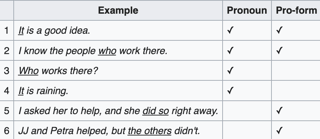The definition of a pronoun according to the Merriam-Webster Dictionary is "any of a small set of words... that are used as substitutes for nouns or noun phrases". The definition of a pro-form according to A Dictionary of Linguistics and Phonetics is a "term used... to refer collectively to the items in a sentence which substitute for other items or constructions," fully captured below:
Additionally, here is the same dictionary's entry for pronoun:
The Wikipedia entry for pronoun has the following diagram distinguishing pro-forms from pronouns:
The justifications for (3) and (4) are that "in (3), the interrogative pronoun does not stand in for anything. Similarly, in (4), it is a dummy pronoun, one that does not stand in for anything."
I am having troubling squaring how we distinguish pronouns from pro-forms with how we define pronouns and pro-forms. Am I correct in attempting to clarify that pronouns are not simply 'words used as substitutes for nouns' (which would make pronouns a subset of pro-forms), but instead, pronouns can embody additional grammatical content (i.e, the interrogative and dummy pronoun forms seen in (3) & (4)) that no noun could represent (i.e, there exists pronouns that aren't substitutions for nouns, thus non-pro-form pronouns)? Or am I babbling nonsensically, and I am missing some basic logic?


